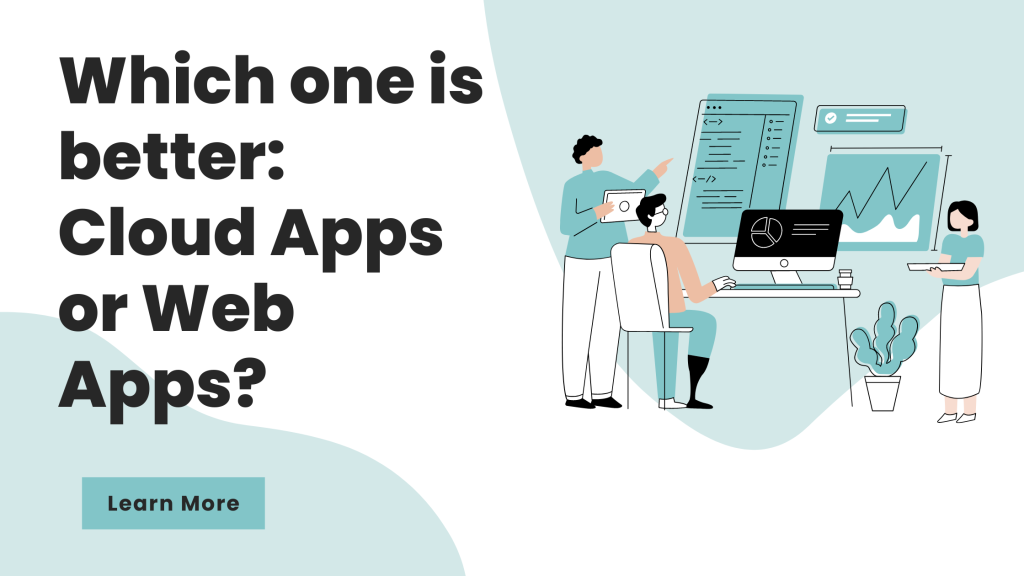Apps are helpful and potent tools for people of all types, from online consumers to small businesses to international organizations. Apps have increased sales, audience involvement, vital analytics gathering, communication channel improvement, business process optimization, and more. As a result, it’s not surprising that apps are being called an “integral component” of our online lives. The development of a company’s app can be handled by a web application development company.

But what exactly is an app? And how does it differ from a cloud application or a web application? It’s critical to understand the meaning of each and the key features that distinguish them to choose which one is ideal for you.
In addition to computers, any mobile device, such as smartphones or tablets, can run an app. It can be used to perform tasks like accessing the internet, playing music, or sending an email. Apps are typically designed to be user-friendly and easy to use.
Web applications and cloud apps are on a level playing field in terms of popularity. In terms of usage, they are similar, but they differ greatly in terms of technology. To help you choose the right one, let’s examine them closely. In recent years, cloud application development has become increasingly popular.
Also Read: Why You Should Focus on Improving CodeIgniter Web Development?
Web apps
A web application is accessed via a browser, and it requires a continuous internet connection to run, so it’s common to use it for online tasks. Web apps are commonly used by online retailers, banks, e-ticketing companies, and even social networking sites. While some web apps can be used offline, most will require an internet connection to function properly.
Advantages Of Web Apps
– Can Be Used On Any Device: One of the main advantages of web apps is that they can be used on any device with a web browser and an internet connection.
– No need to install: The fact that web apps don’t need to be installed on your device is also a benefit. You only need to go on app’s website using your internet browser.
– Automatic Updates: Web apps will automatically update when new features are released, or security patches are applied.
Cloud apps
Apps that run in the cloud are called cloud apps. Cloud apps are often used for tasks that require high computational power or storage capacity, such as video editing or gaming. While cloud apps can be used offline, they typically need an internet connection to function properly.
Email is a good illustration of cloud-based software. There are plenty of large businesses operating in the cloud, such as Salesforce, Evernote, Dropbox, and every social media network. These applications aren’t solely housed on users’ phones; they’re used to access apps and information from the cloud.
Advantages Of Cloud Apps
– Scalable: Cloud apps are highly scalable, which is one of their key benefits. As a result, they may be readily increased or decreased as your company’s requirements change.
– Pay As You Go: Another advantage of cloud apps is that you only pay for the resources you use. For businesses with fluctuating needs, this makes them very cost-effective
– High Availability: Cloud apps are also designed to be highly available. This means they can continue to function even if one of the servers goes down.
Differences between Web Apps and Cloud Apps
– Technology: The biggest difference between web and cloud apps is the technology they are built on. Web apps are built on HTML, CSS, and JavaScript, while cloud apps are built on a cloud computing platform.
– Accessibility: The way in which web apps and cloud apps are accessed is another difference. Cloud apps must be accessed from a cloud computing platform, whereas web apps can be accessed from any device with a web browser.
– Functionality: How web and cloud apps are used can differ depending on the task they are being used for. For example, cloud gaming requires high computational power and storage capacity, which a cloud app can only provide.
-Structure: The structure is the primary distinction between web and cloud apps. While both need access to internet services, cloud apps do not always rely on web browsers to function. Cloud apps can be used anywhere, even without a web interface. They may be used on a local computer for small tasks.
-Multi-tenancy: In most cases, web applications are not intended to support multi-tenancy, which means they cannot meet the varying demands of many users. Cloud apps, on the other hand, allow for multi-tenancy and can accommodate various needs and demands of consumers.
-Services: The last distinction between cloud and web apps is the support services. Apps allow customers to interact with a company’s logo; thus, most companies invest in it. Startups aren’t exempt from this trend.
On the other hand, web apps are quite popular since they allow for continuous interaction with others. Consider Airbnb, Amazon, or YouTube: these applications are intended to operate continuously in the background and sync with the internet only when necessary. The examples mentioned earlier are Evernote, Gmail, Slack, Dropbox, and many more.
What Should You Choose as Your Ultimate Option?
The cloud application development services are the best solution if you want to develop an application with high availability, scalability, and security. If you need an app that can be used from anywhere and on any device, this is a good option. However, a web application development company would be a better option if you want to develop a simple application that does not require these features.